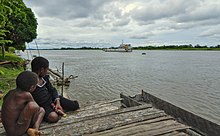Human trafficking in Papua New Guinea
This article needs to be updated. (July 2018) |

Asian
The
The
Prosecution
The Government of
Protection
The Government of Papua New Guinea maintained minimal efforts to protect and assist victims of trafficking during the reporting period. Due to severe resource and capacity constraints, it continued to rely on
Prevention
During the past year, the Papua New Guinean government made few efforts of its own to prevent trafficking during the reporting period. The government did, however, sustain partnerships with international organizations and NGOs to raise public awareness. The Constitutional Law Reform Commission (CLRC) took the lead in coordinating and communicating on trafficking issues, and established an inter-agency Anti-Trafficking Committee that included foreign government and NGO members. In partnership with IOM, the CLRC conducted the first National Human Trafficking and Smuggling Conference in March 2009, involving over 120 participants from both the government and NGO groups. Participants produced a resolution to ratify the
See also
References
- ^ a b c d e f "Trafficking in Persons Report 2010 Country Narratives -- Countries N Through Z". US Department of State. 2010-06-17. Archived from the original on 2010-06-17. Retrieved 2023-02-17.
 This article incorporates text from this source, which is in the public domain.
This article incorporates text from this source, which is in the public domain.
- ^ "Trafficking in Persons Report 2017: Tier Placements". www.state.gov. Archived from the original on 2017-06-28. Retrieved 2017-12-01.
